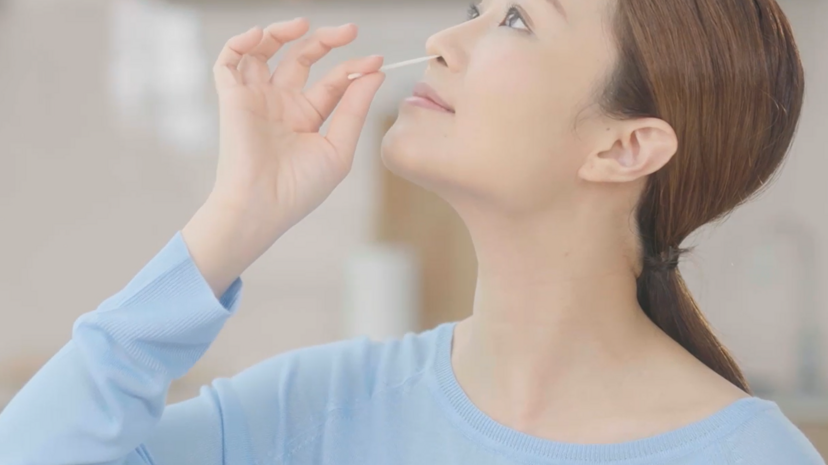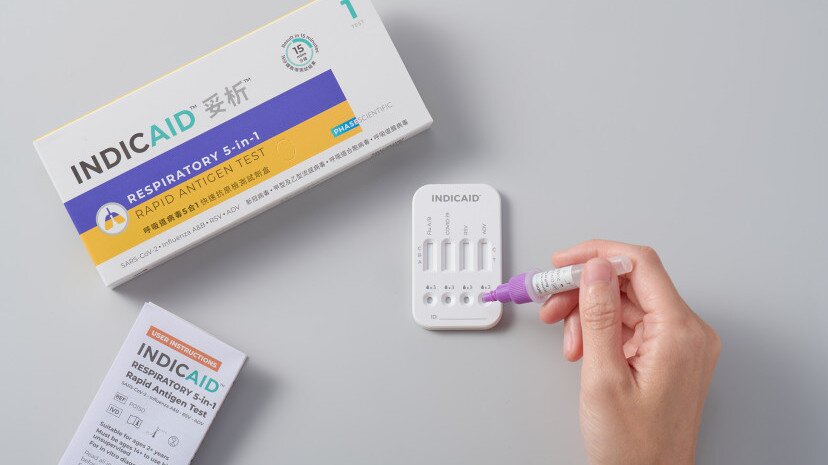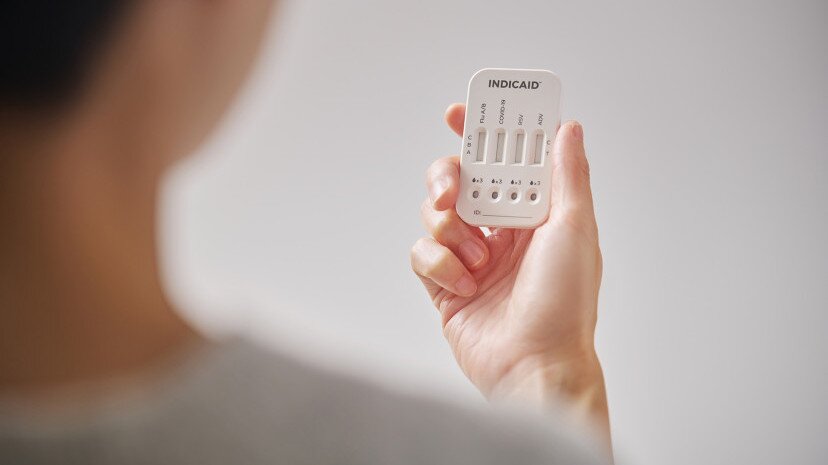INDICAID RESPIRATORY 5-in-1 Rapid Antigen Test
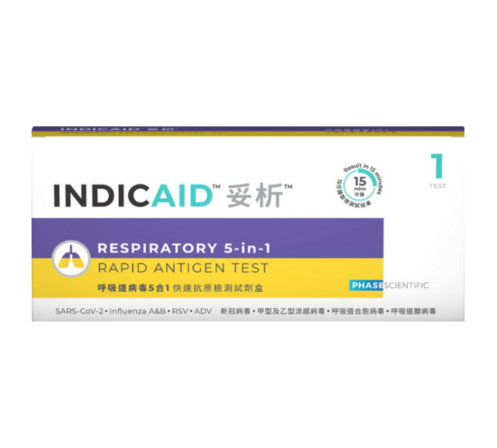
Keep your respiratory health in check with INDICAID RESPIRATORY, a 5-in-1 test that quickly detects 5 common respiratory viruses (COVID-19 / Flu A & B / RSV / ADV) that might be responsible for your flu or cold-like symptoms!
- For in-vitro diagnostic use only
- Currently available in Hong Kong only
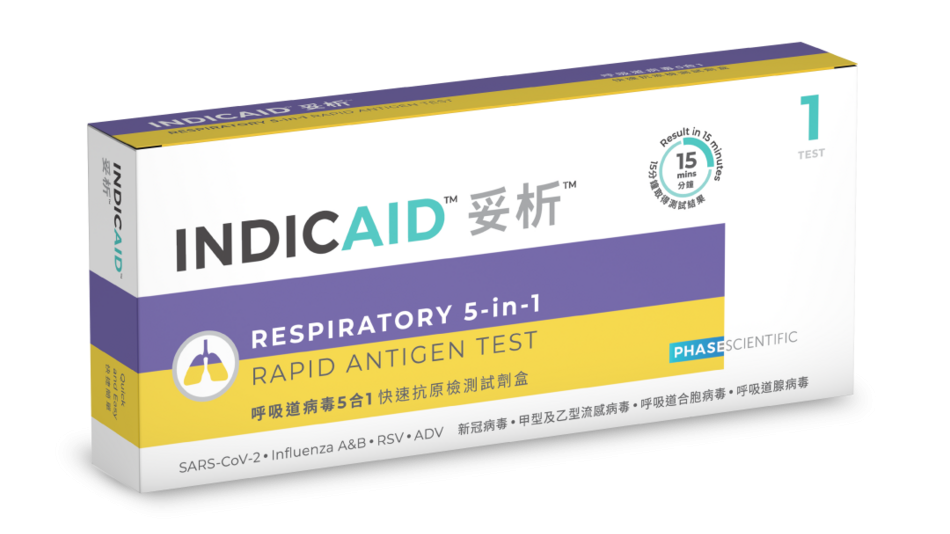
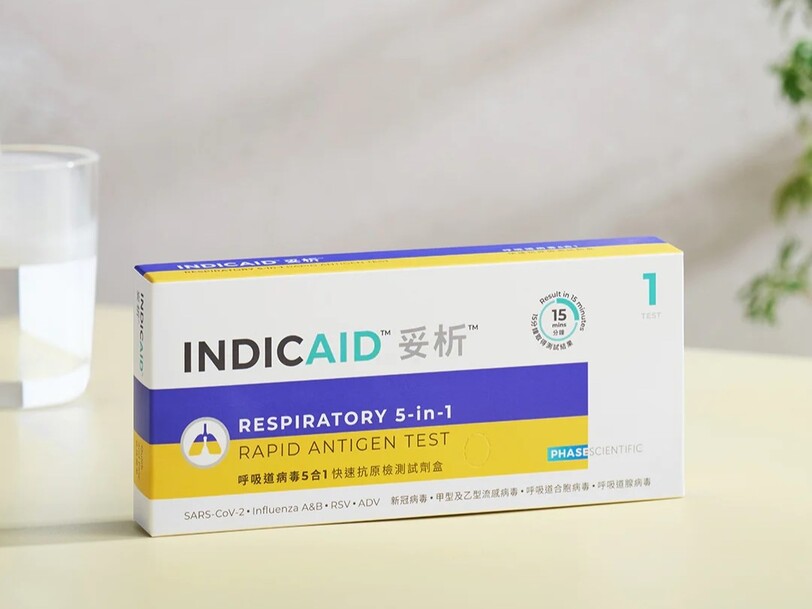
Features
- Detect 5 viruses at once
- More accurate than comparable brands#
- Hong Kong Brand
- 99% accuracy
- Painless shallow nasal swab
- Suitable for children
- Results in 15 minutes
- Simple result interpretation
Remarks
#INDICAIDTM RESPIRATORY 5-in-1 Rapid Antigen Test has a Limit of Detection (LoD) over twice as low as other comparable brands. A low LoD value means the test can detect the virus even when the viral load is low, or when the patient is in an early stage of infection, which can help patients access earlier treatment options.
Test Result Interpretation
| CT Indicator | Result | |
|---|---|---|
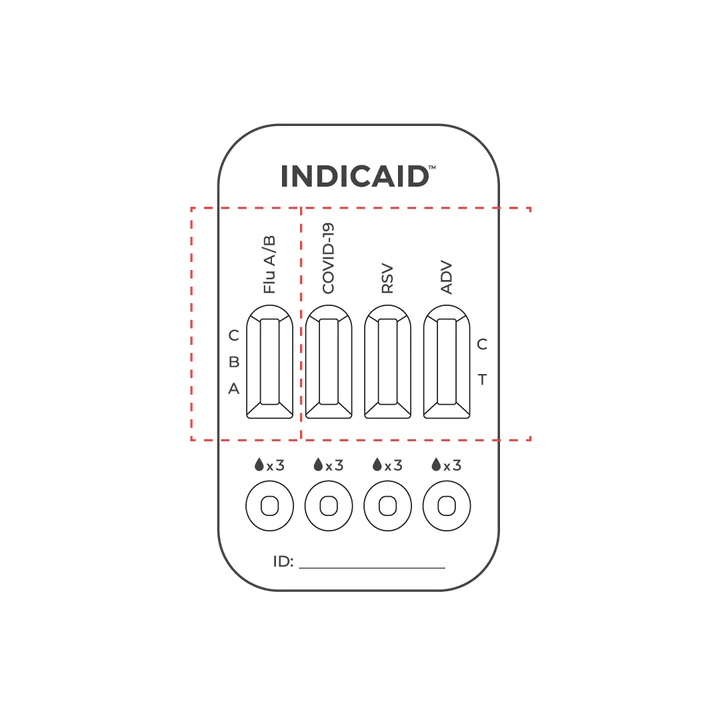 | This test has 4 result windows, each showing test results for different respiratory viruses: | / |
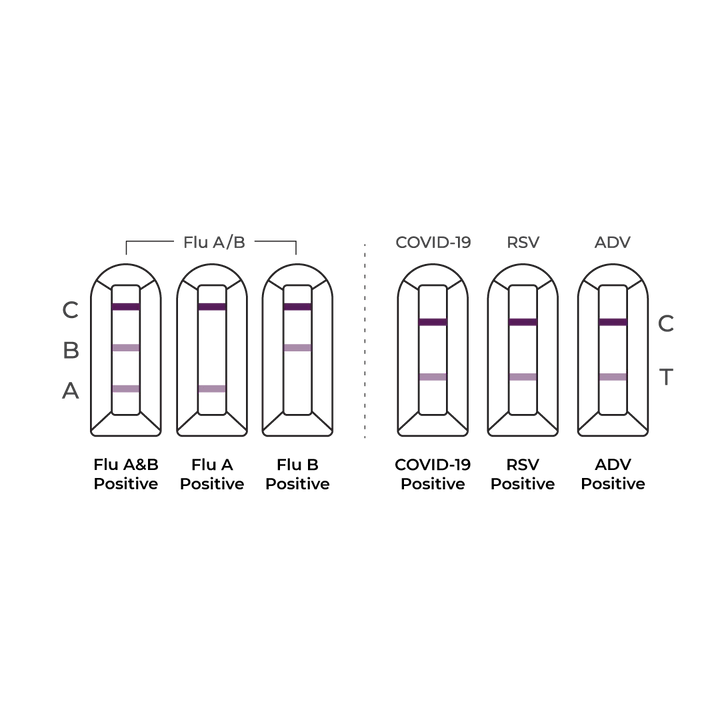 | RESULT 'C' Line AND any 'A', 'B', or 'T' Line | Positive |
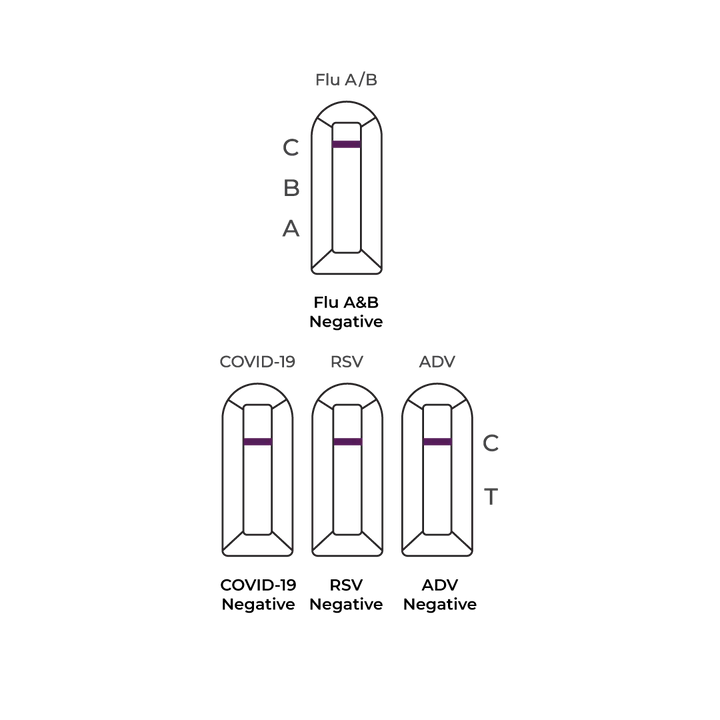 | 'C' Line Only | Negative |
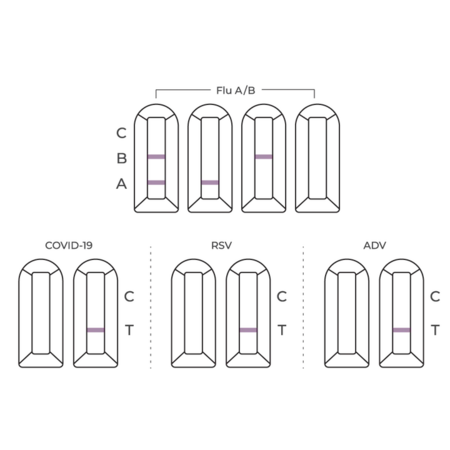 | No 'C' Line | Invalid |
Specifications
| Specimen type | Anterior nasal swab |
|---|---|
| Sensitivity & Specificity | INDICAIDTM RESPIRATORY 5-in-1 rapid antigen test has an overall 99% accuracy |
| Storage condition | 2-30oC. Do not freeze. Avoid direct sunlight |
FAQs
The INDICAIDTM RESPIRATORY is a 5-in-1 test that quickly detects 5 common respiratory viruses (COVID-19, Flu A&B, RSV, ADV) that might be responsible for your flu or cold-like symptoms, allowing you to receive the appropriate treatment in time and reduce risk of complications.
Although COVID-19, flu A&B, RSV, and ADV share similar symptoms, incl. fever, chills, cough, sore throat, and runny nose etc., different treatments are required. Correctly identifying the virus that is responsible for your symptoms can enable access to the right treatment options, reducing risk to you and your family’s health.
COVID-19 (coronavirus disease 2019) is a disease caused by the SARS-CoV-2 virus. Most common symptoms from a COVID-19 include fever, dry cough, and fatigue. However, those who have a COVID-19 infection can also experience a wide variety of symptoms including loss of taste or smell, nasal congestion, sore throat, etc. According to the WHO, about 10-20% may also experience mid to long-term effects of COVID-19, collectively known as ‘long COVID’.
Spread through respiratory droplets or contact with contaminated surfaces, general recommendation against COVID-19 infection includes the wearing of masks, vaccination, and maintaining good personal hygiene.
According to recommendations from the Centre for Health Protection (CHP), those who tested positive for COVID-19 and are at higher risk (e.g. immunosuppressed people, older people, people with underlying medical conditions) and those who have developed obvious symptoms are recommended to seek medical advice. Symptomatic individuals are advised to stay at home and asymptomatic individuals can go out or go to work at will.
For more information about COVID-19 infection, please refer to the following website for more information:
Seasonal influenza, otherwise known as the flu, is an acute illness of the respiratory tract that is common in Hong Kong from January to March/April, and from July to August each year. The most common seasonal influenza viruses to affect humans are influenza A (flu A) and influenza B (flu B).
Influenza commonly spread through droplets when infected people cough or sneeze. Symptoms those infected with influenza viruses may experience includes fever, sore throat, runny nose, muscle pain, fatigue, and headache. However, when those at a higher risk (e.g. older people, children, and people with underlying medical conditions) are infected with influenza viruses, the illness may lead to further complications such as bronchitis, chest infection, or even death.
According to the Centre for Health Protection (CHP), those infected from influenza are recommended to take rest and drink plenty of water, and refrain from work or attending school. For cases complicated by bacterial infection or more severe infections, antibiotics or antiviral agents may be required under doctor’s prescription.
For more information about influenza infection, please refer to the following website for more information:
Respiratory syncytial virus infection, or RSV, is a common respiratory infection that occurs in Hong Kong throughout the year. RSV causes respiratory tract illnesses such as infection of the airway, lungs and middle ear, and is the most common cause of bronchiolitis and pneumonia for infants under the age of one. Common symptoms of RSV infection may include fever, runny nose, cough, headache, decreased appetite and body ache.
Spread through respiratory droplets or contact with contaminated surfaces, RSV infections tend to be mild, and can be managed with supportive treatments. However, severe cases of RSV may require oxygen therapy and tube feeding. For cases complicated by bacterial infection, antibiotics may be required. Antiviral agents may be used for those with congenital heart or lung disease.
For more information about RSV infection, please refer to the following website for more information:
Adenoviruses, or ADV, are a group of viruses that infect the mucous membrane in human. ADV infections can occur throughout the year.
ADV can cause respiratory illnesses, and other illnesses such as diarrhoea, eye infection and rashes depending on the virus serotype. ADV symptoms may include cough, runny nose, sore throat, fever, abdominal pain, diarrhoea, and pink eye infection. Typically spread through respiratory droplets, contact with contaminated surfaces, or ingestion of contaminated food or water, ADV may cause outbreaks in settings such as schools and hospitals.
There is no specific antiviral medicine to treat ADV. Patients are advised to rely on supportive therapy and drinking plenty of water to assist in their recovery.
For more information about ADV infection, please refer to the following website for more information:
An antigen is a molecule or molecular structure present in a pathogen that, when detected in the human body, can trigger an immune response. Common antigens include simple molecules such as carbohydrates, fats, hormones, and larger molecules including polysaccharides, phospholipids, nucleic acids, and proteins.
Antigens are present in SARS-CoV-2, flu A & B viruses, respiratory syncytial virus, and adenoviruses, which can often be found in the respiratory tract during early-stage infections. These antigens, when detected, can serve as markers for disease exposure.
The test uses shallow nasal swab samples, which are collected from the nostrils.
The INDICAIDTM RESPIRATORY 5-in-1 Rapid Antigen Test has 4 sample wells and result windows, each showing test results for Flu A & B, COVID-19, RSV, and ADV respectively.
The INDICAIDTM RESPIRATORY 5-in-1 Rapid Antigen Test has an overall 99% accuracy
INDICAID™ RESPIRATORY 5-in-1 Rapid Antigen Test is now available at indicaid.com, Watsons Pharmacies, Watsons online shop and major pharmacies.
- Immunocompromised people incl. children, elderly and chronically ill patients
- People with relevant epidemiological or contact history with those who are suspected or have been infected with respiratory viruses
- Frontline staff who are in frequent contact with customers
- People who frequently use mass public transportation
- People who attend large gatherings, visit communities or venues with a high population density
- Collect anterior nasal swab specimen
- Stir the swab into the buffer solution by pressing and rolling the swab against the inner wall of the vial 10 times
- Drop 3 drops of the buffer solution into each of the sample wells in the test device
- Read the results promptly in 15 minutes (results after 20 minutes should not be used)
The sample collection process is very simple. The swab only needs to be inserted about 2.5cm into the nostrils (and not as far as the nasal cavity), which will not cause any pain or discomfort to the user.
People aged 2 or above are eligible for the test. Swabbing should be performed by an adult for children aged 2 to 13.
This test has 4 result windows, each showing test results for different respiratory viruses:
FLU A/B (influenza A / influenza B): Look for the lines next to the ‘C’ (Control), ‘A’ (Flu A), and ‘B’ (Flu B).
COVID-19 (SARS-CoV-2) / RSV (respiratory syncytial virus) / ADV (adenoviruses): Look for the lines next to the ‘C’ (Control) and ‘T’ (Test)
FLU A/B (influenza A / influenza B): Look for the lines next to the ‘C’ (Control), ‘A’ (Flu A), and ‘B’ (Flu B).
COVID-19 (SARS-CoV-2) / RSV (respiratory syncytial virus) / ADV (adenoviruses): Look for the lines next to the ‘C’ (Control) and ‘T’ (Test)
- Negative: ‘C’ line only
- Positive: ‘C’ line AND any ‘A’, ‘B’, or ‘T’ line
- Invalid: No ‘C’ line. If no ‘C’ line is seen, the test result is INVALID even if you see a ‘A’, ‘B’, or ‘T’ line
The test could not tell whether or not you have COVID-19, flu A, flu B, RSV, or ADV. The test needs to be repeated with a new kit and freshly collected anterior nasal swab sample. If you develop COVID-19, flu A, flu B, RSV, or ADV symptoms or your symptoms become severe, seek medical attention immediately.
The SARS-CoV-2, influenza A, influenza B, RSV, and/or ADV virus(es) were detected in your sample. It is very likely that you have the respective infection(s) and are contagious. You are advised to consult your healthcare provider on the interpretation of your test results, and your treatment options based on your medical history and symptoms.
The proteins from SARS-CoV-2, flu A, flu B, RSV, and/ or ADV virus(es) were not detected in the sample. A negative result does not rule out SARS-CoV-2, flu A, flu B, RSV, and/or ADV infection. There is a higher chance of false negative results with antigen tests than with laboratory-based molecular tests. This means that there is a higher chance this test will give you a negative result when you have SARS-CoV-2, flu A, flu B, RSV, and/ or ADV infection. If you tested negative and continue to experience COVID-19, flu A, flu B, RSV, or ADV-like symptoms of fever, cough, and/or shortness of breath, you should seek follow-up care with your doctor.
Product Resources
Product Catalogue

